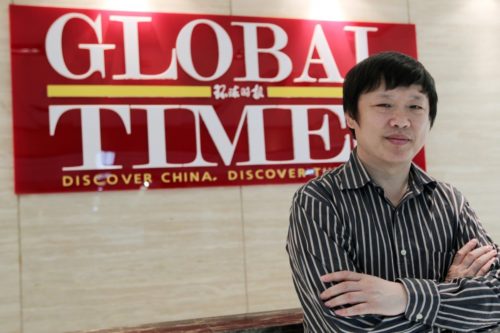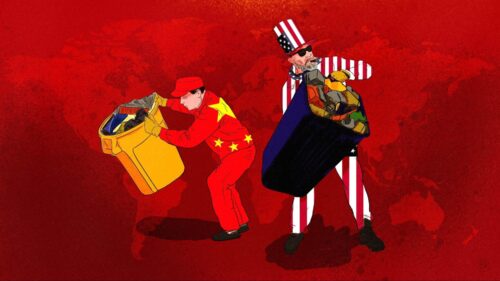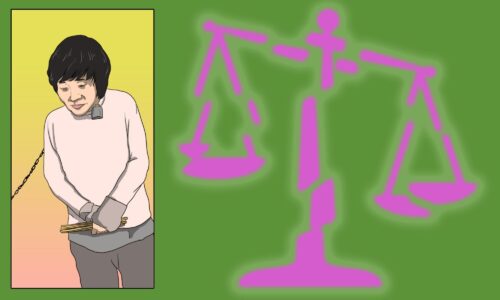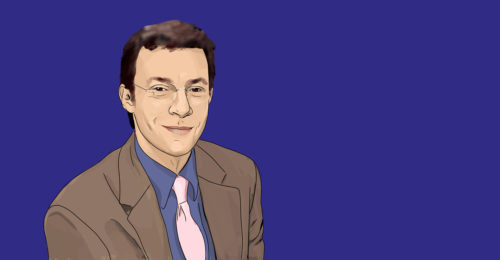“Why do you ask, are you a spy or something?”
Rattling machine guns and the dying yells of Japanese soldiers blare from a TV behind the newsagent. Framed by the glaring lights of his booth on a busy Beijing street, he eyes me with a joking smile — but the beginnings of a frown — as I casually ask which papers sell well. The state secrets of this kiosk are closely guarded. Only when he’s satisfied that I’m merely curious does he rummage among the popular local morning and evening dailies, flipping out a tabloid sporting the loud red and yellow banner of the Global Times.

It’s unsurprising, really — over the past 30 years, this state-owned publication has muscled its way into the big leagues of Chinese media. As David Bandurski, director of the China Media Project, tells me, it sells itself as “a bit like China’s id — its primitive, instinctual voice that can amplify its deeper resentments, its wounded sense of glory.”
Global Times is a voice of rising paranoia, painting a country under siege from hostile alien forces, poised to trample China with any weapon at hand (including cake). For just 1.5 yuan (22 cents), commuters can read explosive op-eds arguing China should prepare for wars (of defense, of course) on the Indian border and the South China Sea, foam-flecked articles claiming destructive “thug” Hong Kong protesters were given international funding, exclusive reports of Australian spies undermining Chinese society, and so on and so forth.
It taps into the part of the demographic hungry for more colorful takes than the comparatively measured statements of People’s Daily and Xinhua. It has been called “China’s Fox News.”
Nationalism sells. Last year’s circulation was 2 million a day (just 443,000 for the New York Times), 30 million online viewers per month. “The more popular the Global Times,” notes one commentator, “the more distorted Chinese people’s ability to perceive society and the world.”
Noticing that it is owned by People’s Daily, journalists and experts mistakenly call Global Times a “mouthpiece” when in fact it often speaks for itself. Analysts are often content to cite it as sufficient evidence of decisions made right at the top, when in fact the reality is more complex, the paper performing a balancing act between the demands of profit, Party, and patriotism.
But people have one thing right: The paper’s spiritual center is its outspoken editor-in-chief, a former soldier turned newspaperman. The Global Times is the voice of China’s id; that voice belongs to Hú Xījìn 胡锡进.
Who is Hu Xijin?
It’s hard to know. Most information comes from the interviews he’s given to foreign media over the years, almost all from his bland office in the People’s Daily compound in eastern Beijing. But such platforms present for him an opportunity to craft the narrative, swerving from aggression to placation, perhaps depending on the nationality of each paper’s audience.
How to arrive at the truth when your source is a maelstrom of contradiction? Hu referred to Hong Kong rioters in 2019 as “ISIS-like terrorists” and advocated firing live rounds at them — despite himself being at democratic protests in Tiananmen Square in 1989. In May 2020, he advocated mutual “respect” between societies, but less than a month before had called Australia “gum stuck to the bottom of China’s shoe.” During the Bō Xīlái 薄熙来 scandal of 2012, his newspaper drew scorn for saying that corruption needed to be rooted out, but “China has no way of entirely suppressing corruption.”
Such doublethink means Hu gets his fair share of criticism in China, especially among intellectual elites. To them he is “Frisbee Hu” (飞盘胡 fēipán Hú) — a dog that swerves every which way to catch the latest CCP curve, an attention-seeking Party lackey.
Real estate tycoon Rèn Zhìqiáng 任志强 (now imprisoned for criticizing Xi Jinping) disliked how Hu stirred up trouble and flipped his messages, “saying this today and that tomorrow.” Tsinghua professor and prominent sociologist Sūn Lìpíng 孙立平 calls him a “traitor” who “lacks human dignity.” Quartz has reported that he’s been criticized by one former Chinese ambassador to France as ignorant of global affairs, one senior Chinese journalist commenting that he peddled “patriotic conspiracy theories.” In 2011, artist Ài Wèiwèi 艾未未 even shared Hu’s private phone number on Twitter after a spat between the two.
Some Chinese netizens also find him too slippery. Despite Hu telling CNN that the Global Times reflects the “true sentiments of Chinese society,” one 2012 post on Sina Weibo (now deleted) named him one of the “10 Most Horrid People of 2012.” Some Weibo posts riff on the Chinese name for Global Times (环球日报 Huánqiú Shíbào) to call it “Muddled Shit Times” (混球屎报 Hùnqiú Shïbào).
Hu gets his fair share of criticism in China, especially among intellectual elites. To them he is “Frisbee Hu” — a dog that swerves every which way to catch the latest CCP curve.
A typical frisbee spin came in May this year, in the wake of online criticism of a Global Times article by Hu. He argued China needed 1,000 extra nuclear warheads to guarantee peace through “strategic tools.” Despite defending his arguments, he released a Weibo post eight days later encouraging both the U.S. and China to seek what they had in common ideologically. China should “work with all countries to explore ways in which different political systems and societies can respect and intermingle with one another.” For some netizens, the shift from arms race to de-escalation was comically abrupt.
But it was also under his watch that the Global Times broke its silence around the Tiananmen Square massacre, publishing articles on anniversaries that interviewed former protesters about their motives, breaking one of the big taboos of Chinese media (albeit only in its English edition). Hu has written posts on Weibo championing free speech, on how the Ministry of Ecology and Environment was hiding data on water pollution, even that the Great Firewall should eventually be dismantled. He’s claimed to have refused to withdraw articles at the request of local Party officials, citing the media’s independence to “facilitate the functioning of society under the leadership of the Party.”
But note the last part of that sentence. He’s been a loyal Chinese Communist Party member since 1986, and the Party’s needs always come first. Former employees say Hu sees his newspaper as the Party’s second wife; the first wife is the dutiful and dignified People’s Daily. In this analogy, the Global Times is the outspoken spouse always ready to complain.
Yet Hu never sows chaos in Chinese society. Championing free speech never takes precedence over maintaining stability in China; he supported imprisoning “liar” Liú Xiǎobō 刘晓波 after Liu was awarded the Nobel Prize. Praising press freedom ends when stories tarnish China abroad: Western journalists reporting on Xinjiang often come into Hu’s sights, who are scorned for hoping to “profit” from negative coverage of China.
Becoming Hu Xijin
From looks alone, you expect a viewpoint as unique and independent as his dress sense. Unlike other gray and browbeaten cadre journalists, Hu cuts a striking figure in loud ties, polo shirts, and a bob haircut, with a fondness for Tolstoy and Twitter storms.
Hu says he was struck by a sense of duty during his formative years in the People’s Liberation Army. Son of poor migrant workers from Henan, his family was low enough to escape the excesses of the Cultural Revolution. In 1978, aged 18, he joined the Nanjing Institute of International Relations, an institution that trained students to be military diplomats. Officers told all cadets they were now “part of the revolution.” The emphasis was on obedience to the Party and the nation, with 5 a.m. drills, laps, and slogans (“Be vigilant, protect the motherland!”) to keep the blood up. It was this training, Hu claimed in 2011, that made him feel obliged to “journalistically defend the nation.”
In 1990 he became a People’s Daily war correspondent in Bosnia for three years. Seeing Russians begging on the streets of Belgrade after the collapse of the USSR, and witnessing the violent break-up of Yugoslavia, convinced him that no good came when a strong autocracy fragmented. “I became aware of the fragility of a country,” he told state media in 2016. “Once unrest breaks out, it is simply not something we as individuals can control.”
Therefore individual freedoms mustn’t compromise social stability: a strong communist government was required, capable of seeing democratic protests in both 1989 and 2019 for what they really were — the harbinger of chaos.
So good thing he’d been on the losing side at Tiananmen.
In June 1989, Hu listened eagerly to Voice of America radio bulletins in Tiananmen Square, positioned there every day until the army’s crackdown. “It was like a flow of emotion,” he told the New York Times. “I felt full of hope that we could turn into a democratic country like the United States.” He left before the violent crackdown.
Although he’s repented of his “very radical” ways, Hu still seems to eye Western press freedoms with envy. “I think the U.S. is a good place,” Hu said in possibly his most open interview (for Southern Weekly in 2011). “If I could choose where to be born, I’d very likely choose the U.S. The U.S. has many advantages…there’s a lot of freedom to enjoy.”
But freedom should be enjoyed up to a point. “I’ve given my life to China,” he continued. “Which makes me work hard and struggle to change this country and make life meaningful.”
Hu has personal reasons for peddling patriotism and the Party line. Despite championing everything Chinese, stories have emerged that his son was educated in Canada and has now migrated there. Hu has denied this, but journalists who know him, like former Phoenix Satellite TV reporter and ardent CCP critic Zhāng Zhēnyú 张真瑜, say it’s true. Hu also owns a mansion in Beijing worth 25 million yuan ($3.7 million) and is said to boast openly about his “financial freedom” in private. Zhang claims Hu isn’t interested in the national interest, only “to keep his property and official position, and to ensure his family can have sufficient funds to live overseas.” Perhaps Hu’s championing of free speech is to allow his unorthodox voice to keep making him money.
A different kind of news media
That he’s out to make money is no secret. “We are market-driven media,” Hu told Quartz in 2016. In 1993, People’s Daily wanted a new money-making international branch to add to its stable. Fluent in English and Russian, with substantial experience in international reporting (also covering the Iraq War in 2003), Hu was the prime candidate when the editor’s chair fell vacant in 2005.
Hu realized there was a gap in readership among conservative, well-educated, and high-income urban Chinese, wary and weary of Xinhua news bulletin rehashes. Even today, as Quartz found, readers believe the Global Times “always speaks the truth.”
There would be a big market for stories that no other outlet was writing about, so Hu started promoting himself as an “alternative” to the usual form of media. Consequently, he has written on things others wouldn’t touch, like the trials and tribulations of the European leg of the 2008 Olympic Torch relay.
Being alternative could also mean pandering to distrust of government — hence his critique of the Great Firewall. “Old Hu” — as he calls himself on Weibo — is on the reader’s side, trying his hardest to tell them things despite the censors.
Arguing for free speech certainly boosts this image. Reporting in the national interest sometimes means going against the Party line. In 2016, Hu told a state media outlet that micro-management from Party cadres damaged this freedom. “If the media are all like this, is it in the national interest?”
Hawkish comments get noticed by Western media. Global Times has cuttings pinned up in its offices from all the foreign media it’s been quoted in that month. No doubt as an incentive to keep up the provocation.
It was the brash editorials he started writing in 2009 that made the paper’s name. A more hawkish approach to foreigners may also have catered to national pride. Some Chinese believe state media’s default reaction of uniform politeness to foreign powers doesn’t always reflect real Chinese opinions. Hu’s tougher approach reminds the country that it isn’t going to be pushed around anymore.
Popularity is partly the result of a rigged system though. “Media controls on real journalism and on international coverage have skewed the market,” says Bandurski. “Cheap saber-rattling nationalism has become a politically safe form of attracting attention in the media marketplace.”
But Hu knows he needs to be careful. In 2011, he said he often had to write apologies to displeased officials. The Global Times has had its knuckles rapped in the past, forced to retract articles in May 2016, with editors summoned to the Cyberspace Administration of China because of “a serious violation of news discipline”: an online poll asking readers if Taiwan should be unified by force.
Hu’s posts on Weibo about free speech, the abolition of the Great Firewall, and the articles on the June Fourth Incident from 2009 have all been deleted (but you can find this last one on the Wayback Machine). It’s notable though that he still attempted to address the 30th anniversary of June Fourth last year with an article discreetly titled “Thirty Years On.” But the piece is somewhat pitiful, not mentioning what the anniversary commemorates, full of stories about how Chinese youth prefer the stability of China compared to the chaos of the West.
There are real dangers for journalists in state media who go against Party policy today. A balance is struck at the Global Times — “Don’t just strive to pioneer, but also to remain extremely safe,” reads a sign in their offices. Hence, as media researcher Chengju Huang has argued, Global Times is “conservative yet unorthodox” — it will often say things in a way that is inflammatory, but mainly along Party lines.
But patriotic media outlets have a place in the diversified media market of most developed countries. Hu has said repeatedly that if China is to truly emulate the West, it needs a broader set of voices in print, “hawks as much as doves.” Whereas diplomats are cautious and guarded, someone in China needs to push China’s interests on the world stage. “Look at how many voices against China come out of the U.S. side every day,” he protested in defense of his 2020 nuclear warheads article. “And how many voices against the U.S. do we produce from our side?”
Besides, hawkish comments get noticed by Western media, recognition that conservative Chinese voices have a presence on the world stage. In that case, the paper gains, too — Global Times has cuttings pinned up in its offices from all the foreign media it’s been quoted in that month. No doubt as an incentive to keep up the provocation.
Hu is in charge of editorials, dictated ad hoc to aides — on planes, at his home on weekends, even while driving. Producing such a large amount of material — also recording videos where he voices his opinions, often every other day — means he probably resorts to a formula, summed up by one netizen as “for domestic affairs, they catch the frisbee; as for foreign affairs, they bark all the time.”
It can’t have been easy balancing messages for the Party, the West, the nation, the markets, and the people over 30 years of rapid political change. If Hu ignores the government, “It will sanction us,” he told Quartz in 2016. “If we lose the support of the ordinary people and lose our influence, the government won’t care about us anymore. Without ordinary people, our paper will die.”
That means facts aren’t always the priority. Reporters will sometimes be sent out into the field to gather evidence that confirms Hu’s opinion. If they find a situation that plays opposite to his arguments (one reporter was hard-pressed to find any angry comments or protest at Prince William’s wedding in 2011), they will be asked to keep on looking, fitting facts around Hu’s prefab.
What can the CCP get from him? His 23 million followers on Weibo, with whom he regularly shares his more aggressive “stick-it-to-the-foreigners” tweets, is perhaps evidence enough for them that Hu has public opinion on his side. One Global Times editor has said the People’s Daily has called the newspaper “a representative voice of China’s popular opinion.” That means it’s a valuable source of grassroots information and often left alone.
Being connected to public opinion also makes Global Times a valuable Party platform. Chinese journalists tell stories of phone calls from the Propaganda Department saying only the Global Times can write an op-ed about a certain topic. Hu admitted that the Party has sometimes ordered the Global Times to write an editorial, or use a prescribed angle.
The exact nature of Hu’s government links and obligations is unclear. He certainly keeps in regular contact — editorials on sensitive topics require it. Quartz reported Hu often fraternizing with officials, saying that his editorials often represent what they’re really thinking behind the scenes. The BBC reckons he’s “close to President Xi.” The New York Times thinks he plays a key role in conveying China’s stance to the West, striking fear amongst Westerners without the risks incurred if diplomats spoke as vitriolically as he does.
Perhaps the Party has noticed how often his nationalist sound bites get into the Western media. Pundits hang on to his tweets, desperate for a whiff of news about the thinking of Chinese policy makers — Hu sometimes announcing their decisions a few hours before them, more certain revelations delivered with the line “based on what I know.” Sometimes, his tweets are treated as fact by foreign media, even with no official announcement. He uses the platform to provoke the West, telling Americans to re-elect Trump, as it’s “crucial to China’s rise.” A Global Times death threat to Taiwanese President Tsai Ing-wen would never have been given without his approval. Getting quoted in foreign or domestic media is the end goal. Positive or negative, “in general attracting attention is a good thing.”
But what has been the cost? Hu has said that before he started at the Global Times, state media made it look like “foreign reports said that China was good, praised China; now, you can hear all the world’s criticism of China in the Global Times.” Coverage of mistreated Chinese abroad is a recipe for outrage other newspapers have copied, one Xinhua journalist told author Pál Nyíri. David Rennie at The Economist notes Hu’s barbed talk is now being echoed in the rhetoric of government officials in charge of international relations.
It all filters down, all the way to the kiosk owners who sell Hu’s papers. Not all foreigners are spies — but Hu has grown rich from making ordinary Chinese see them this way.
Chinese Lives is a weekly series.






